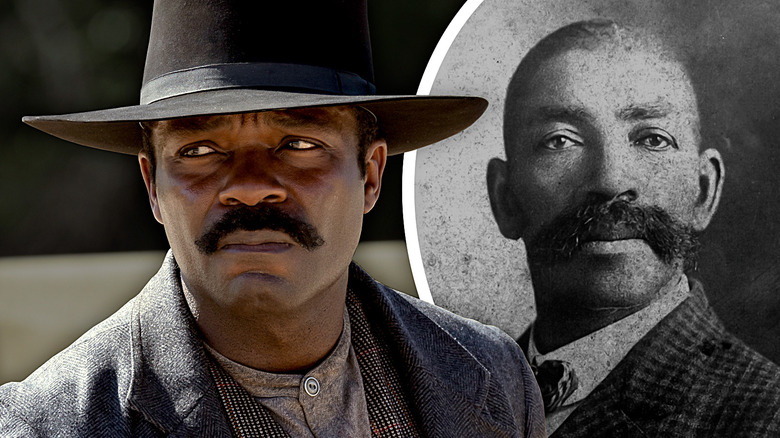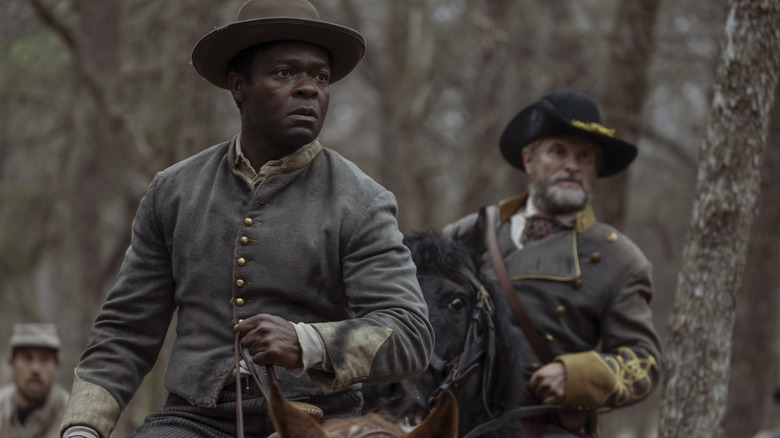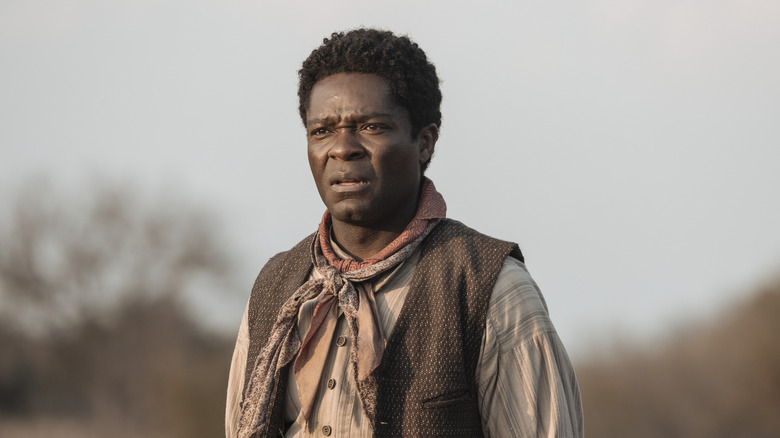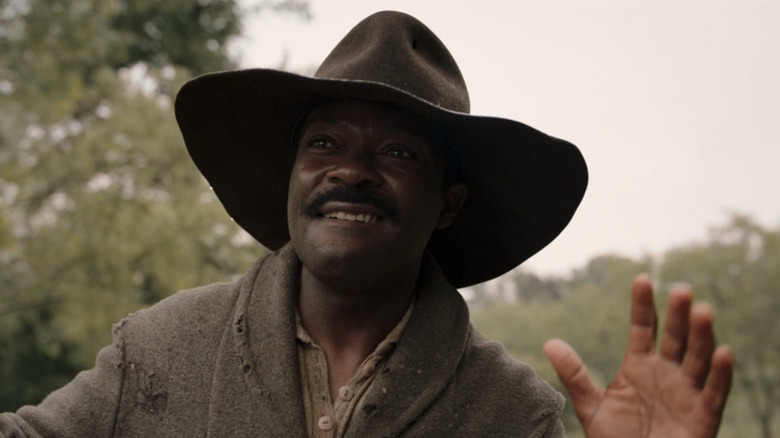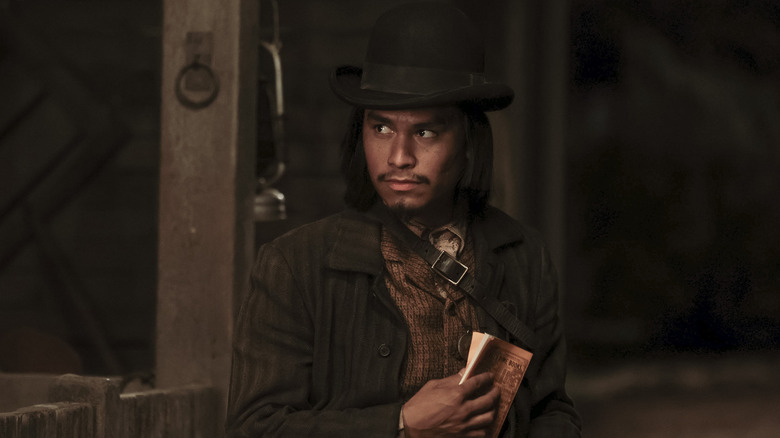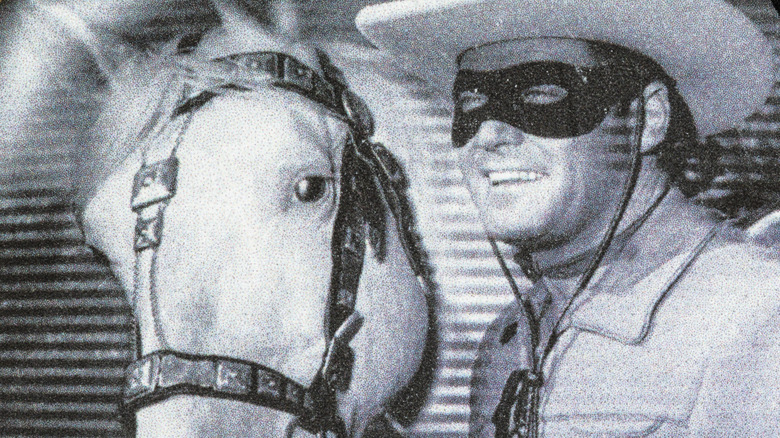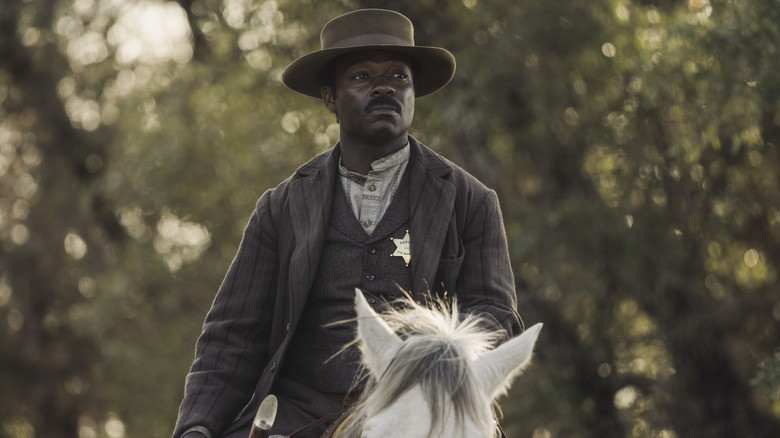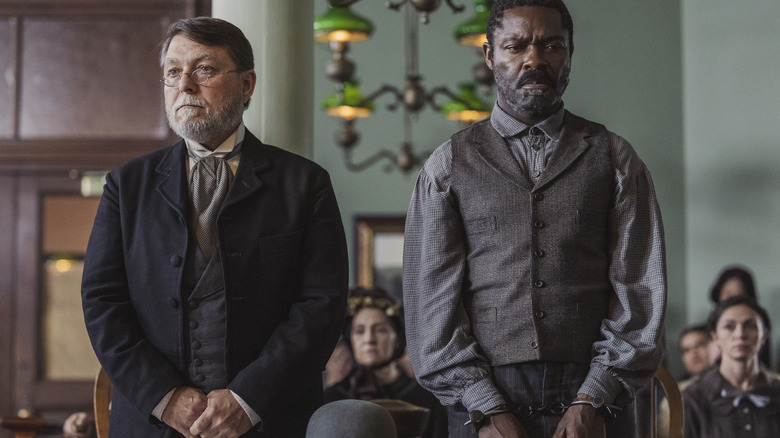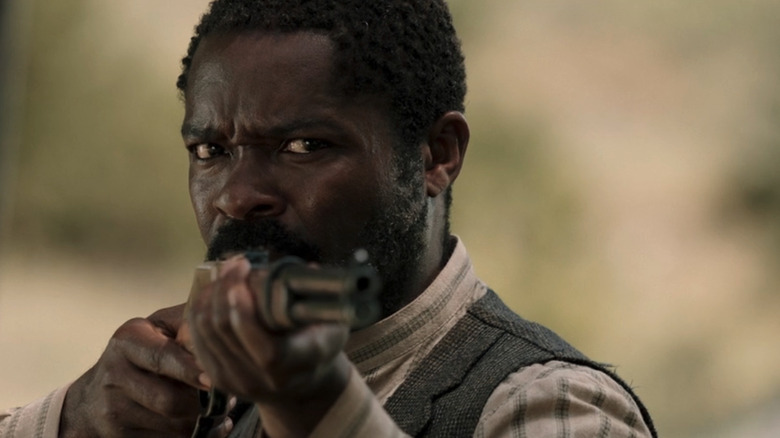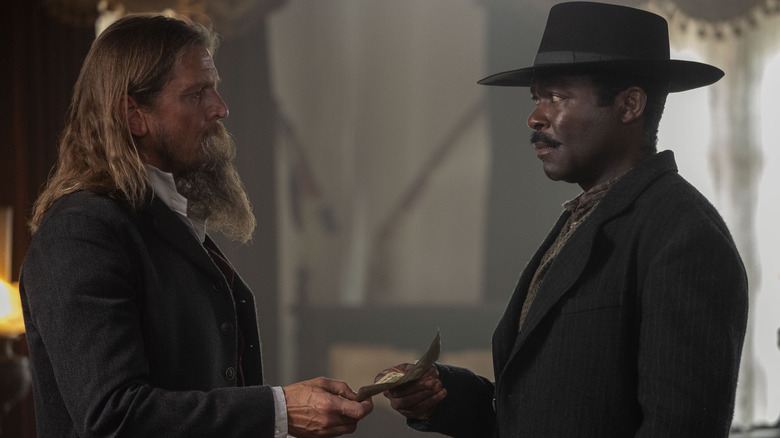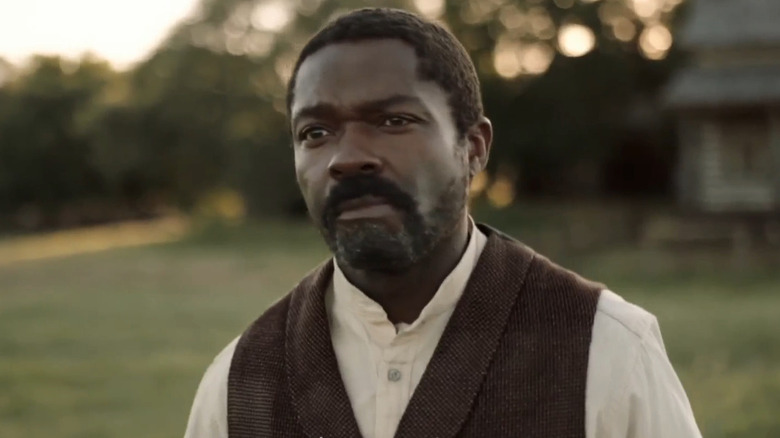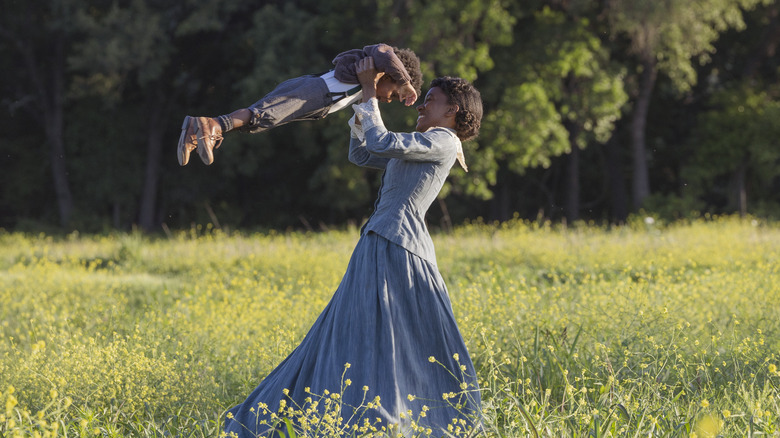Everything Lawmen: Bass Reeves Doesn't Tell You About The True Story
The Paramount+ series "Lawmen: Bass Reeves" hails from superstar executive producer Taylor Sheridan, the man behind "Yellowstone" and its smash hit Western prequels "1883" and "1923." This time, though, Sheridan enlisted writer Chad Feehan to spearhead the series, and unlike Sheridan's previous efforts, the series isn't an original creation telling a new story — it's a biopic of one of America's most under-appreciated lawmen from the Wild West, Bass Reeves.
Often said to be the first Black U.S. marshal in the nation's history, Reeves was a slave early in his life. But following a daring escape and years on the run living with Native Americans, Reeves became a free man thanks to the Emancipation Proclamation. He was eventually hired to become a marshal after authorities recognized his tremendous abilities as a tracker and justice-seeker whose strict moral code made him the perfect man for the job. The series focuses on this time in Reeves' life, when he brought down a number of notorious criminals and made his name as one of the most feared gunmen in the West.
But how much did "Lawmen: Bass Reeves" get right? Much of the bigger picture is fairly accurate, but many of the main players were created for the series. Meanwhile, the story also omits quite a few major parts of Reeves' life and minimizes other elements for the sake of drama and telling a good, concise story. But we dug into the history books — well, the history websites, anyway — to set the record straight and shed some light on what "Lawmen: Bass Reeves" doesn't tell you about the true story.
Bass Reeves fought for the Union army
In the opening episode of "Lawmen: Bass Reeves," the future U.S. marshal is seen reluctantly fighting alongside the Confederate army against Union forces during the Civil War. As the property of Colonel George Reeves, Bass was enlisted as a member of his regiment in battle. By all accounts this was true, with historical records indicating that he did indeed fight for the South during America's bloodiest internal war, forced into service by his master.
Eventually, though, Bass Reeves escaped enslavement. In fact, the show's depiction of Bass beating Reeves to near-death during a game of cards is supposedly just how it happened, though others say he may have simply run away after hearing stories of freed slaves elsewhere. But the story of his Civil War service may not have ended there, as according to the Oklahoma Historical Society, he also served with the Union Indian Home Guard Regiments on the side of the Union later in the war following his escape from Reeves while living in Native American territory.
After the war, it may have been this experience with the Union that convinced the marshal service that he was worth trusting as a guide in their manhunts in Native American territory. In 1875, Judge Isaac C. Parker — not the fictional Marshal Sherrill Lynn — hired Reeves to work for the Fort Smith federal court as a deputy U.S. marshal.
The first Black marshal faced discrimination in the service
A series centered on the lesser-known story of the first Black U.S. marshal, "Lawmen: Bass Reeves" is an attempt to shed light on a sorely overlooked figure in American history. But while the series shows Reeves facing the struggle of racism as a freed slave during Reconstruction, it surprisingly pays little but lip-service to the true nature of the discrimination that Reeves was almost certainly subjected to, both from the people he protected and his fellow lawmen.
Sadly, the series downplays the belligerence he incited among locals via merely existing. In most episodes he strolls through majority white towns and elicits little more than quizzical looks, when the reality is that he faced real anger and hostility wherever he went, and not just from outlaws and ne'er-do-wells who feared him. In "Lawmen," Reeves is widely respected for his badge alone, and one episode even sees him hailed as a hero and equal comrade by a Texas ranger. But it's hard to imagine a Black lawman being so easily accepted in the South, so soon after the Emancipation Proclamation ... particularly by those wearing a badge.
Admittedly, it's been said that the land still run by Native Americans was somewhat more colorblind than most regions in the era, but he still faced plenty of racism even among lawmen. And while the series does show resentment among fellow former slaves for his law enforcement role, it rarely shows race being an issue for him among those serving the court, except for the vilest of villains.
Reeves was known for his cunning and guile
By all accounts, Bass Reeves was indeed every bit the skilled fighter the series portrays; various accounts talk up his ability to take down multiple men in hand-to-hand combat and wield not one, but two pistols — one in each hand — with the skill of a competitive shooter. Nevertheless, the show mostly glosses over his renown and reputation as a man who didn't need a gun to take down the deadliest criminals.
The legend of Bass Reeves, in fact, is littered with stories of how he tricked his way into capturing his bounties. While the show does depict one story where he befriends the mother of two wanted murderers by posing as an outlaw himself, Reeves' career was dotted with these kinds of stories. There were even accounts of Reeves dressing up as a woman, or getting the drop on would-be murderers with his so-called "letter trick."
As the story goes, Reeves was taken hostage by a pair of hardened killers who suspected he was the notorious marshal, Bass Reeves. But Reeves insisted he was just an ordinary man, and handed them what he said was a letter from his wife that he asked the men to read to him because he was illiterate. When the outlaws let their guard down to read the letter, Reeves swiftly drew his pistols, arrested them, and brought them in for trial. As legend has it, he repeated this trick many more times.
Billy Crow is an amalgam of several real-life figures
One of the central characters in "Lawmen: Bass Reeves" is Billy Crow, played by Forrest Goodluck. In the series, Crow is introduced as a member of a crooked gang that Reeves brings in, but the lawman sees the young Native American man as merely misguided and eventually enlists his aid as an assistant of sorts. Crow is a fictional character who isn't based on a single individual; instead, he's inspired by more than one Native American guide who often rode with Reeves.
During Reeves' time as a marshal, it was common — and sometimes highly preferable – that lawmen be accompanied by Native American guides. For Reeves, this was a fairly simple matter, as he spent years living among the Cherokee, Seminole, and Creek tribes, knew their traditions and languages, and remained friendly with many of them. But when riding out for bounties, Reeves wouldn't always bring the same man along — he rode with a number of different guides. For simplicity's sake, the series lumped them all together and created Crow.
The insertion of the fictional Crow — a former outlaw himself — helps the series form a moral parallel to Reeves, who was himself a reformed killer. He gives the younger outlaw Crow a second chance as a way of paying what he sees as a debt to his conscience, doubling the purpose of the character in the series.
Bass Reeves may have inspired the Lone Ranger
A legend in his own time, Bass Reeves seemed to be all but forgotten in pop culture over the decades as Western folklore focused more on heroes like Wild Bill Hickok, Wyatt Earp, and Bat Masterson. But in recent years historians and pop culture critics have rediscovered Reeves and some believe he wasn't forgotten by everyone: He may have been the basis for the fictional radio, movie, and comic book hero known as "The Lone Ranger."
Scholars have pointed out similarities between Reeves and the "Ranger" that are almost too striking to be purely coincidental. For starters, both of them wielded dual revolvers and famously rode a white horse while hunting down dangerous villains. Both were famous for being crafty in their work, with a preference for using disguises and artful trickery over casual gunplay to stop their enemies. Both rode with a Native American companion, and Bass was known for leaving behind silver dollars just as the Lone Ranger left silver bullets.
These similarities weren't lost on star David Oyelowo. "It's impossible to ignore the parallels, but it becomes a chicken or egg thing: Are we telling Reeves' story, or confirming that the Lone Ranger borrowed from those stories?" Oyelowo asked in an interview with USA Today. Ultimately, Oyelowo embraced the similarities and trained hard to recreate the Lone Ranger's iconic horse-riding pose for the show's poster. "I wanted the world and my 6-year-old self to see that specific shot."
He was once ordered to hunt down his own son
From escape from enslavement to his career as a famed federal officer, "Lawmen: Bass Reeves" hits all the biggest notes in his life — or many of them, at least. The series stops short of telling some of his greatest stories and concludes while Reeves' is still in the prime of his career. But Reeves' days as a U.S. marshal continued well into the 20th century when he was in his 60s, and there's one story from Reeves' latter days that may be his most famous: When he was instructed to chase down and apprehend his own son.
That son, Bennie, married Castella Brown in 1900, and just a few short years later, she was dead by his hand. Brown had been having an affair with another man, and Bennie shot and killed her in a jealous crime of passion. While Bass Reeves' superiors wouldn't initially give him the assignment of bringing Bennie in, documentation suggests that nobody else wanted to be the one to arrest the younger Reeves. And so, when Bass insisted on apprehending Bennie himself, he did just that, and brought him in for trial following a two-week manhunt.
In the end, Bennie Reeves was tried and convicted of murder and received a life sentence at Leavenworth Penitentiary. After being incarcerated for more than a decade, though, Bennie was released thanks to a citizen's petition and some good behavior, and he remained a law-abiding citizen up until his death in 1958.
He was represented at trial by a renowned U.S. attorney
One of the most critical moments in Bass Reeves' career as a marshal was his trial on murder charges for the killing of his posseman and cook. In "Lawmen: Bass Reeves," the trial is breezed through quickly and the entire incident takes up mere minutes in an episode with a broader story, but the reality of the courtroom drama was enormous. He was even represented by one of the most famous U.S. attorneys of the era, William Henry Harrison Clayton.
Clayton also served at Fort Smith alongside Reeves, and the two were well acquainted; some accounts indicate they were friends. Reeves wasn't Clayton's only famous friend, though — colonial legend and Pennsylvania founder William Penn was also among his confidantes. He served as a member of the court under seven different U.S. presidents and played a large role in changing the face of law and order in the Old West. Appointed to Judge Parker's court at Fort Smith by Ulysses S. Grant, he led as many as 10,000 cases during his 14 years as an attorney, and had an unmatched record in murder convictions.
Many believe he was framed for the murder of his posse cook
The trial of Bass Reeves is quick in "Lawmen," and the murder of his cook is shown as a killing in self-defense after the man draws a weapon. But the historical accounts of the killing differ: In the series, Billy Crow suggests they lie and claim that Reeves accidentally shot the cook when cleaning his gun, and that may have been how it really went down.
According to most accounts, the cook — William Leach — was killed by Reeves' gun, and the marshal himself insisted that it was a tragic mistake, while several eyewitnesses testified to that effect. Though the show portrays Reeves being immediately arrested after it happened, the real Reeves wasn't accused of the killing until almost two years after he'd been cleared of wrongdoing in an official inquest. But because the charges were brought by a newly installed U.S. attorney — and former Confederate — many believe that the charges were trumped up by Reeves' racist rivals as a way of getting the badge taken away from him. And that's exactly what happened, as Reeves spent more than three months behind bars before his acquittal.
What the show also doesn't show is how the trial affected him. As Texas Monthly once detailed, Reeves' spent his life savings on the trial, even selling his farm. While he returned to his job as a lawman, he was forced off to Paris, Texas, leaving his wife and children behind for several years, during which his wife Jennie died of cancer.
Reeves had several real-life nemeses
For all of Bass Reeves' incredible exploits — for all the arrests he made as a U.S. marshal in his decades behind the badge — he never once encountered a former Confederate-turned-marshal named Esau Pierce. That storyline is fictional, and more representative of Reeves' personal struggle than an adaptation of a specific manhunt. Yet, throughout his days as a lawman, Reeves did make a number of notable arrests of several outlaws that one might consider persistent nemeses.
One such individual was Bob Dozier, who spent most of his life as a humble farmer and turned to a life of crime out of pure greed. Not just a thief and killer, Dozier did it all — rustling cattle and robbing stagecoaches, and was both a horse and a jewel thief. On the run for years, the law could never catch him, and his brazenness led to death threats against Reeves when the renowned marshal took up the manhunt. It took many months, but eventually, Reeves tracked Dozier to Cherokee country, and after a fierce gunfight — in which an opening round barely struck Reeves' head — Dozier was killed with a shot to the neck after he raised his rifle on Reeves.
Another high-profile target was the Seminole outlaw named Greenleaf who'd outwitted law enforcement for nearly 20 years. But thanks to Reeves, Greenleaf was captured and brought to justice in 1890.
Reeves became a police officer later in life
From his days fighting on both sides during the Civil War to his career as a bounty-hunting U.S. marshal, Bass Reeves lived quite the adventurous life. History records that during his time as a marshal, Reeves arrested some 3,000 outlaws and killed 14 men while insisting he never fired his gun unless his life was in danger. But his days as a lawman weren't over when retired from the Marshal Service.
That retirement came after working in Muskogee Federal Court in 1907 when Oklahoma attained official statehood. From there, Reeves took off one badge, and put on another to become a police officer in Muskogee, Oklahoma. By all accounts he'd lost none of his edge and tenacity, and was a faithful law enforcement officer in the town. Some of the most famous photos of Reeves come from this time, including more than one where he was photographed with the entire Muskogee Police Department which boasted multiple Black officers.
Reeves remained in service with the local police until the end of his life three years later when he died of Bright's disease. He left behind a legacy in history and pop culture that, while diminished for decades, has roared back in recent years thanks to portrayals in movies like "Hell on the Border," "They Die by Dawn," and "The Harder They Fall," and TV shows like "Legends of Tomorrow," "Wynonna Earp," and now "Lawmen: Bass Reeves."
Bass Reeves' home life was a bit different
The fictionalized version of Bass Reeves portrayed by David Oyelowo in "Lawmen" is a father and husband in addition to being a dedicated U.S. marshal. In the series he's married to Jennie, a fellow former slave who he'd been in love with while a slave under Colonel George Reeves. After nearly killing the colonel, however, Bass goes on the run, only reuniting with Jennie years later after the war and eventually fathering five children with her. In real life, things were somewhat different.
Jennie in the series is based on Reeves' real-life wife Nellie Jennie, who like her fictional counterpart was a slave in Texas. But there's little evidence to suggest that Jennie ever lived together with Bass while he was living under George Reeves, and the first mentions of her on record are census data from after they were married. By 1870, though, they had four children: Sarah, Robert, Harriet, and Georgia. They moved to Van Buren, Arkansas after being wed, and before the end of Jennie's life she'd given Bass at least 10 children (11 by some accounts).
Sadly, while Bass was away in Paris, Texas, for a lengthy stretch, his wife Jennie died of peritonitis, the result of a bout with cancer, in March of 1896 at the age of 56. Following her passing, Bass Reeves remarried in 1900, spending his remaining days with Winnie Sumter, who outlived Reeves by almost a decade.
